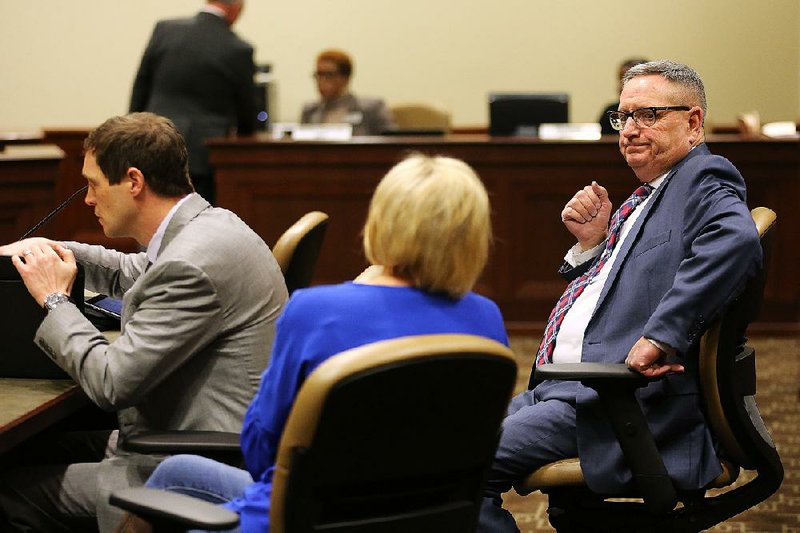The effort to triple the number of conditions that qualify patients to use medical marijuana in Arkansas died Wednesday.
After nearly an hour of testimony before the House Rules Committee, House Bill 1150 by Rep. Douglas House, R-North Little Rock, failed to get even a motion to put the bill to a vote. The testimony included the state's top two health officials telling members that Gov. Asa Hutchinson opposed the legislation.
House, along with about a dozen patients, testified for the bill while the Arkansas Health Department director, Dr. Nathaniel Smith, and state Surgeon General Gregory Bledsoe testified against the measure.
"It's dead," House said afterward. "We presented the case. They heard it and don't feel like it needs to be done at this time."
The bill would increase the number of qualifying conditions for an Arkansas medical marijuana registry ID card from the current 18 to 57. The Health Department recently began issuing the cards in anticipation of the first dispensary opening in the coming months.
[RELATED: Complete Democrat-Gazette coverage of medical marijuana in Arkansas]
Also Wednesday, the Arkansas Medical Marijuana Commission approved three requests from dispensaries to move closer to population centers.
Arkansas became one of 33 states to legalize cannabis for medical use when voters in 2016 approved Amendment 98 to the Arkansas Constitution. Bureaucratic and legal delays have slowed the program's implementation, but the first cultivation facility has begun growing and dispensaries expect to begin opening in April.
House and patient advocates told the House Rules Committee that most patients are already purchasing the drug off the street. Adding more qualifying conditions, they said, would bring those people "out of the dark."
House also said his bill would prevent patients from lying to their doctors to get a recommendation for a cannabis card.
"We don't want to live in the dark," said Melissa Fults, a cannabis patient and advocate who uses the drug to treat asthma. "We want to follow the law."
The current qualifying conditions are: cancer, glaucoma, HIV/AIDS, hepatitis C, amyotrophic lateral sclerosis, Tourette's syndrome, Crohn's disease, ulcerative colitis, post-traumatic stress disorder, severe arthritis, fibromyalgia, Alzheimer's disease, cachexia, peripheral neuropathy, intractable pain, severe nausea, seizures and muscle spasms.

Smith and Bledsoe said they opposed the bill because there's a lack of scientific research showing cannabis' clinical effectiveness, and, in some cases, cannabis is associated with worsening conditions.
[RELATED: Complete Democrat-Gazette coverage of the Arkansas Legislature]
Smith also noted that there's already a process in place to add new qualifying conditions. Residents may petition the Health Department and submit supporting evidence to have a new condition added. That process has only been used once -- for bipolar disorder -- and it was rejected because state medical officials said that medical research doesn't support the use of cannabis to treat that disorder.
Smith and Bledsoe also testified that most of the symptoms that occur with the new conditions proposed in HB1150 are already covered by Amendment 98.
Smith added that while there is a process to add new conditions, there's no process to take conditions away. Smith, whose expertise is in infectious diseases, said that recent developments in the treatment of hepatitis C have found highly effective measures outside of cannabis, and that cannabis can actually increase the rate of liver damage.
However, hepatitis C remains a qualifying condition in Arkansas with 209 people with the disease approved for cannabis cards.
"I don't think those 209 patients know that daily marijuana use will accelerate liver damage, and I doubt the physician who signed off on the qualifying condition is fully aware of that as well because it's a qualifying condition and there's the Arkansas Department of Health logo on the top of that application," Smith said. "So I think we need to be very careful about what we add and subtract."
House said after Wednesday's meeting that Hutchinson's opposition loomed large.
"If the governor opposes it, that was probably persuasive to many committee members," House said. "If that's the case, I'm a little disappointed that the governor didn't get word to me."
Hutchinson, through a spokesman, said he was concerned about broadening the state's medical marijuana program before it gets off the ground.
"The reservation I have is that we are just now implementing the program and making medical marijuana available, and before we expand the program, we need to have more experience with it," the Republican governor said. "The existing legislation is broad enough that a physician who sees a legitimate need has the ability to issue a prescription.
"Rep. House has been a real leader in this area, and I respect his work tremendously."
House also said he didn't think patients would get fair consideration from the Health Department when petitioning it for new qualifying conditions.
Department officials, House said, told him two years ago that they wouldn't approve any new conditions.
Smith, in a Wednesday interview, said he would be open to adding new conditions if there was convincing medical evidence to do so.
"I consider these applications very seriously," he said.
At the Medical Marijuana Commission meeting, members approved three dispensaries' requests to move closer to more heavily populated areas.
• Grassroots OPCO will move from Ward in Lonoke County to Little Rock.
• NEA Full Spectrum Medicine will relocate from Rector in Clay County to Brookland in northern Craighead County.
• Fiddler's Green Marijuana Dispensary will remain in Stone County, moving about about 8 miles closer to the Mountain View city limits.
Patient advocates were extremely disappointed after the House Rules Committee meeting. Several said they felt the committee members weren't listening and had already made up their minds.
Fults said she wished the members would have at least voted on the bill, and she now plans to help get a constitutional amendment on the ballot in 2020 to legalize cannabis for recreational use.
"I swore I'd never fight for recreational," Fults said. "But the state has left us no alternative."
A Section on 02/14/2019
